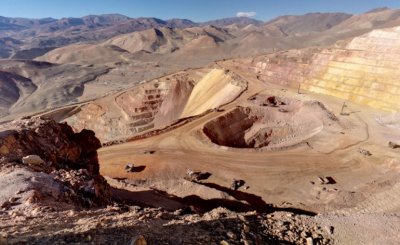- Argentina - Chile:24 de Junio de 2016
Canadian mining giant Barrick Gold fired whistleblower. Then it spilled cyanide into five rivers
Toronto-based mining giant, Barrick Gold, spilled cyanide solution into five Argentina rivers shortly after firing an engineer who raised serious safety concerns about the mining operation responsible for the contamination.
- Court documents obtained by National Observer allege that Barrick, the largest gold producer in the world, abruptly dismissed senior engineer Raman Autar in 2014 to “escape publication” of critical health, safety and environmental violations he found at the Veladero mine, one of the world's largest gold mines.
 The allegations are particularly explosive as the cyanide spill — linked to a valve failure and open sluice gate — dumped more than one million litres of the solution into five rivers in Argentina's San Juan province.
The allegations are particularly explosive as the cyanide spill — linked to a valve failure and open sluice gate — dumped more than one million litres of the solution into five rivers in Argentina's San Juan province.
Barrick would not confirm whether addressing the whistleblower’s list of concerns would have prevented the spill. Autar's lawsuit is ongoing and none of the allegations have been proven in court.
Whistleblower was courted then canned
Whistleblower Raman Autar is a New Zealand national and industry veteran brought to Canada in January 2013 to work as ‘senior manager global maintenance’ for Barrick Gold.
He was offered a salary of more than $275,000 including annual incentive payments. According to his statement of claim, Barrick also promised to support his family in obtaining permanent residency, provide scholarships for his children, and offer financial assistance in purchasing a Toronto home.
But the relationship didn’t last long — Autar was fired in March 2014 after he visited the Veladero gold mine in the San Juan and voiced concerns about its condition, as well as “harassment and bullying” at his job in Toronto. He later alleged that the company fired him for raising his voice.
On March 27, 2015, Autar announced intentions to sue Barrick Gold for more than $10.5 million, citing psychological distress, wrongful dismissal, and breach of fiduciary duty among other grievances.
“He was terminated for raising health and safety and environmental concerns in accordance with the Code of Business Conduct and Ethics,” said the lawsuit, filed by the engineer’s lawyer at Shillers LLP in Toronto. “Barrick terminated Autar’s employment to escape the publication of Autar’s report raising environmental infringements at the Veladero mine in Argentina.”
According to the Ontario Superior Court of Justice, Barrick has filed its intent to defend itself. The company declined to comment on Autar's allegations, but his lawyer, Gil Fischler, confirmed that Autar has now found employment in the mining industry in Vancouver and obtained permanent residency for himself and his family.
Fischler would not elaborate on the violations Autar uncovered at Veladero while the lawsuit remains unsettled.
A powerful company with political influence
According to the court documents, Autar moved from Australia to Toronto for the job with his wife and two young children.
His work visa was tied to Barrick Gold, leaving him unable to seek alternative employment until he found permanent residency, placing him in "an emotionally and financially vulnerable position." He was fired without notice and provided with two weeks' salary, despite a mortgage to pay and a family to raise.
The lawsuit says the “psychological stability of his children” and “substantial losses” the family suffered as a result of their move should have been considered in his termination, and even if Barrick did not owe Autar further fiduciary duty, alleges that 40 months' notice should have been given upon consideration of these other factors.
But Autar is not the only person who claims his family life has been uprooted by Barrick or its mining operations; the company has been at odds with community members, politicians, and activists for more than a decade in Chile and Argentina.
In 2014, former Environment Secretary Romina Picolotti and husband Jorge Daniel Taillant — founders of the Center for Human Rights and Environment (CHRE) — were forced to relocate from Argentina to the U.S. as a result of growing pressure against their organization and their advocacy tackling powerful industrial interests, including Barrick Gold’s two key mining projects in the country, Veladero and Pascua Lama.
According to Taillant, being fired “is the least that can happen” to whistleblowers who speak out against Barrick Gold or those who work to oppose these sorts of investments.
“The corporativist nature of the industry is extremely powerful in places like Argentina”, he explained. “[Barrick] has deals with public officials, ministers, local politicians, and local commercial actors, and they are all working together and will stop at nothing to see large commercial projects like Pascua Lama reach fruition … and there’s a lot of money and a lot of power behind that money.”
Barrick Gold has invested heavily in the Veladero mine — a lucrative operation that churned out 602,000 ounces of gold in 2015 and has another 7.5 million ounces sitting in reserve. Taillant and Picolotti’s advocacy group, CHRE, has been monitoring environmental compliance from mining companies in Argentina since 2005, when Veladero first started operating in the western province of San Juan.
“Death threats against our children”
Picolotti was the Environment Secretary of Argentina between 2006 and 2008. She had been given free reign to clamp down on contaminating industries, but resigned suddenly after being asked by the country’s president to justify the president's veto of a glacier protection law that had recently passed unanimously by Congress. If enacted, the law would have restricted mining and oil drilling, including Barrick Gold’s operations at the Pascua Lama project, located along the Chile-Argentine border.
In an interview with National Observer Taillant described the ordeal that ultimately led the family to flee the country and take CHRE with them:
“We’ve had death threats against our children and our bank accounts, including our organizational accounts at private banks were suddenly and mysteriously closed for no reason. Since we began going after Barrick, we’ve faced fantastical and baseless accusations in the media and in the justice system," he alleged. "We’ve had our attorneys suspended for absurd administrative reasons and have been anonymously slandered before our funders. We’ve been harassed by the tax authorities and the list goes on and on.
“It’s very difficult to link this ongoing series of attacks against us to a company like Barrick, since most of the slandering and threats follows no traceable path. Finally, we realized that we could no longer safely and effectively do our work in Argentina. When you get smear campaigns against you accusing you of corruption it not only places a stain on your reputation, but it dries up your advocacy financing.”
His own allegations have never been proven, and in an email to National Observer, Barrick Gold said Mr. Taillant's claims were false and that it has "never engaged in any such activities."
Taillant however, said Autar's story is "not surprising" and falls in line with the company's disastrous environmental record in South America.
Cyanide spill contaminates five rivers
Earlier this year, a provincial Argentine court slammed Barrick Gold with a US$9.3-million fine for a cyanide solution spill in September 2015 at the Veladero mine visited by Autar. The spill was eventually linked to “a frozen valve and a sluice gate that was left open at the time of the valve failure,” Barrick Gold told National Observer in a separate email statement.
While the company said that the incident posed “no risks to the health of downstream communities”, nine of its high-ranking employees were later charged in relation to the spill. A report from Chile’s Secretariat for Environmental Control and Supervision further criticized the company’s mismanagement of the incident, which — despite Barrick’s initial claims — was found to have contaminated five rivers in the San Juan province.
Over the course of the investigation, Barrick revised the size of the spill at least three times, first claiming “no contamination” but eventually acknowledging that more than one million litres of cyanide solution leaked into the river system.
The incident occurred several months after Autar first raised concerns about poorly-maintained equipment at the Veladero mine, including “machinery not properly maintained for down periods.” Barrick Gold would not comment on whether Autar’s concerns were related to the cyanide spill, or whether addressing them could have prevented it, but did respond to questions about the incident overall:
"The safety of people and the environment is our first priority at all of our operations," said an email statement. "Multiple, independent studies, including by the UN, have determined that the Sept. 2015 incident did not represent a risk to the health of communities. Following the process solution release in September, Veladero has implemented a range of improvements to strengthen and improve environmental safeguards to ensure such an incident cannot occur again. Barrick consistently applies industry leading standards at all of its operations and we remain committed to ensuring the environment around our mines is protected."
Record fines from Chile for hiding the truth
Two years prior to the Argentina spill, the Canadian mining giant was also hit with a record US$16.4-million penalty in Chile, where it was found guilty of 23 violations of its environmental impact agreement at the Pascua Lama gold project on the Chile-Argentine border. The convictions included building earthworks without approval, failing to prevent runoff from mineral acid, and failing to tell the whole truth when it came to such operational failures.
In an unprecedented move, the Chilean environmental regulator had previously ordered a halt to construction of the US$8.5-billion mining project while it investigated the company’s wrongdoing. The company later admitted to the violations and pledged $30 million in fixes after paying just $11.6 million of the total fines, which were reduced for prompt payment.
Barrick’s legal woes continue in the U.S., where a New York district judge ruled in March that it will face a U.S. class action lawsuit accusing it of distorting facts related to the stalled Pascua Lama mine project. Shareholders who acquired Barrick shares between May 7, 2009 and Nov. 1, 2013 are part of the lawsuit, which claims the Canadian company repeatedly and knowingly misled them about whether the mine was complying with environmental regulations.
A history of human rights accusations
The company has also been criticized by Amnesty International and Human Rights Watch over the grave abuse of Indigenous populations and communities where it has built gold mines in Papua New Guinea, including home burnings, gang rapes and violent raids.
Industry watchdog Mining Watch Canada has documented similar violations at Barrick’s mine in Tanzania, and names the company in more than 15 web pages full of reports. Barrick Gold was recently barraged by protests at its annual general meeting in Toronto on April 26.
A communications official with the Mining Association of Canada, the national voice of the industry and an organization of which Barrick Gold is a member, said she was unable to comment on Barrick Gold’s record because she was unfamiliar with it.
According to Barrick Gold's website, the company respects "human rights wherever we do business" and recognizes "the equality and dignity of the people with whom we interact every day." In an effort to remedy some of the problems of the past, it has recently put in place a Human Rights Compliance Program, completed seven audits across security-related subject areas, signed a memorandum of understanding with police near the Pueblo Viejo mine in the Dominican Republic.
It has also launched a remedy program for victims of rape by guards at the Papua New Guinea Porgera mine.
By
Elizabeth McSheffreyFuente:
http://www.nationalobserver.com/2016/06/24/news/canadian-mining-giant-barrick-gold-fired-whistleblower-then-they-spilled-cyanide2561


 The allegations are particularly explosive as the cyanide spill — linked to a valve failure and open sluice gate — dumped more than one million litres of the solution into five rivers in Argentina's San Juan province.
The allegations are particularly explosive as the cyanide spill — linked to a valve failure and open sluice gate — dumped more than one million litres of the solution into five rivers in Argentina's San Juan province.

